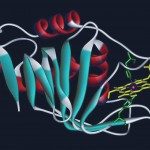Lien vers Pubmed [PMID] – 22006856
Hepatology 2011 Oct;54(4):1157-66
UNLABELLED: Human leukocyte antigen B27 is associated with spontaneous viral clearance in hepatitis C virus (HCV) infection. Viral escape within the immunodominant, HLA-B27-restricted, HCV-specific, cluster of differentiation (CD)8(+) T-cell epitope, nonstructural protein (NS)5B(2841-2849) (ARMILMTHF), has been shown to be limited by viral fitness costs as well as broad T-cell cross-recognition, suggesting a potential mechanism of protection by HLA-B27. Here, we studied the subdominant HLA-B27-restricted epitope, NS5B(2936-2944) (GRAAICGKY), to further define the mechanisms of protection by HLA-B27. We identified a unique pattern of escape mutations within this epitope in a large cohort of HCV genotype 1a-infected patients. The predominant escape mutations represented conservative substitutions at the main HLA-B27 anchor residue or a T-cell receptor contact site, neither of which impaired viral replication capacity, as assessed in a subgenomic HCV replicon system. In contrast, however, in a subset of HLA-B27(+) subjects, rare escape mutations arose at the HLA-B27 anchor residue, R(2937) , which nearly abolished viral replication. Notably, these rare mutations only occurred in conjunction with the selection of two equally rare, and structurally proximal, upstream mutations. Coexpression of these upstream mutations with the rare escape mutations dramatically restored viral replication capacity from <5% to ≥ 70% of wild-type levels.
CONCLUSION: The selection of rare CTL escape mutations in this HLA-B27-restricted epitope dramatically impairs viral replicative fitness, unless properly compensated. These data support a role for the targeting of highly constrained regions by HLA-B27 in its ability to assert immune control of HCV and other highly variable pathogens.

